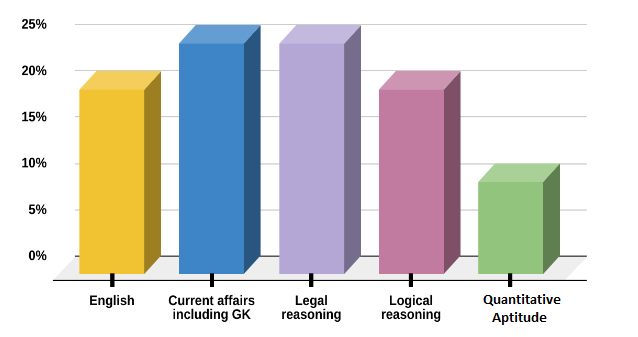CLAT 2026
The Common Law Admission Test (CLAT) is a national level entrance exam for admission to undergraduate law programme at 24 National Law Universities across India. The exam is conducted by the Consortium of National Law Universities.The exam is scheduled for 1 December 2025
Several affiliate universities and organisations also use the CLAT exam for Admissions to the 5-year integrated LLB programme that commence in the Academic Year 2025-2026 shall be through the CLAT 2024.
CLAT Important Dates:
| Application Form Start Date | 15 July 2025 |
| Last Date of Filling Application Form | 15 October 2025 |
| Date of Examination | 1 December 2025 |
CLAT 2026 for UG Programme:
| Duration of the exam | 2 hours |
| Types of questions asked | Multiple-choice questions |
| Number of questions | 120 |
| Marking scheme | 1 mark to be awarded for a correct answer; 0.25 marks will be deducted for an incorrect answer |
| Mode of exam | Offline |
| Subject Area of CLAT |
|
CLAT Syllabus 2026 - Subjects & Weightage
The question paper of the CLAT 2026 exam will carry different weightage for all subjects, therefore, the candidates taking the exam need to prepare well. Candidates can refer to the table given below to get an idea about weightage and marks distribution:
Weightage and Marks distribution:
|
Section |
Questions |
Weightage (%) |
|
Current Affairs, including General Knowledge |
28-32 |
25% |
|
English Language |
22-26 |
20% |
|
Logical Reasoning |
22-26 |
20% |
|
Quantitative Techniques |
10-14 |
10% |
|
Legal Reasoning |
28-32 |
25% |
|
Total |
120 |
120 |

CLAT 2026 Syllabus: Subject-Wise Details
The five subjects of the UG CLAT 2026 syllabus test some common and some subject-specific skills. While the common skills are reading, critical thinking and analytical skills, the subject-specific skills are different for each subject.
Syllabus for English Language and Comprehension.
The clat English section is primarily a test of candidate’s language skills- reading, comprehension and grammar. the question are asked from 6 to 7 passages of around 450 words. each passage is followed by a series of multiple-choice Type questions. The difficulty level of the syllabus of English will be maximum of 12th class student , Students have to read the passage and answer the underlying questions. Accordingly, the passages are drawn from fiction, non-fiction and journalistic sources such as newspaper and magazines.
Important topics for CLAT English are
- correcting incorrect grammar sentence
- synonyms and antonyms
- Fill in the blanks
- tenses
- Spotting, grammatical errors
- Vocabulary
- Idioms and phrases
- Active and passive voice
CLAT syllabus for General knowledge and Current Affairs
General knowledge and current affairs will have 25% of the questions making it one of the most important section in the question paper. The clat general knowledge largely remain static and Tests The basic knowledge of candidates in subjects such as history, economics, political science and technology, whereas clat current affairs will be based on topics of national and international importance that have been featured in the recent news. The difficulty level of the syllabus of general knowledge and current affairs will be maximum of class 12th level.
Important topics for General Knowledge and Current Affairs are
- Contemporary events of significance from India and the world
- Arts and culture
- Historical events of continuing significance
- National and International Affairs
- Government Schemes
- Science and technology
- Submits and conferences
- Sports
- Awards and honours
- Art and culture
- Important Dates
CLAT syllabus for Legal reasoning
The legal reasoning for clat will have a weightage of around 25%. Although prior knowledge of law is not required in this, only some level of similarity with the subject and current legal affairs will help the candidates answer questions. In this regard the consortium mentions that candidates will benefit from general awareness of current legal and moral issues while applying general principles or propositions in various fact scenarios.
The legal reasoning questions will be drawn from 6 to 7 passages of 450 words. Each. These passages will contain various factor situations or scenarios with legal matters, public policy question or moral philosophical enquiries. The passes are drawn from non-fictional sources as policy reports and legal journals. Each passage will be followed by series of multiple-choice question
Important topics for Legal reasoning are
- Concepts of law
- Law of tort
- Indian penal code
- Law of writs
- Legal current affairs
- The Indian Constitution
- The Indian contract act
- Public international law
- Personal laws related to bigamy
- Special marriage act
- Bigamy and constitution
- Penal law
- Information and technology act
- Hindu marriage act
- Muslim law
- New amendments and bills
- Indian polity
CLAT syllabus for Logical Reasoning
With 20% weightage in the question paper, the logical reasoning section attempts to test the reasoning of the candidates. Most questions in the logic reasoning, follow a similar paragraph pattern containing statements, arguments, and facts. The language and tone of the passage can be tricky with the use of words like And/or, where/there, all/some, etc. Additionally, the section will have arguments and patterns which candidates will have to use to draw relationships or apply those arguments in different situations. The difficulty level of the syllabus of Logical reasoning will be maximum of class 12th level.
Important topics for Logical Reasoning are
- Statements and arguments
- Blood relation
- Logical sequences and matching
- Clocks
- Calendars
- Analogies
- Series
- Sitting arrangement
- Syllogism
- Blood relations
CLAT syllabus For Quantitative Aptitude
Although this portion carries only 10% weightage, it is considered a game changer due to its very factual answer options. However, unlike general maths, this portion will not have a straightforward problem. Questions in this will be framed from a short of facts, conditions, data, graph or textual representation containing numerical information. Candidates will have to study that information before answering the underlying questions. While gathering and processing, such numerical information may consume time, the skill tests are basic to mathematics only. The difficulty level of the syllabus of quantitative techniques will be maximum of class 10th level.
Important topics for Quantitative Aptitude are
- Algebra
- Profit and loss
- Ratio and proportions
- Basic algebra
- Statistical estimation.
Check out our other CLAT Courses CLICK
The syllabus is indeed a lengthy one. As a result. The question paper is also very lengthy requiring students to read around 20,000 words and answer the question within 120 minutes. candidates preparing for Clat-UG are advised to praectice sample paper questions throughout their preparation. The clat previous year question papers are one of the most important sources that not only make the candidate similar with the actual test, but also make them habitual of solving such lengthy papers within available time limits.


